Thousands could unknowingly have alcohol brain damage
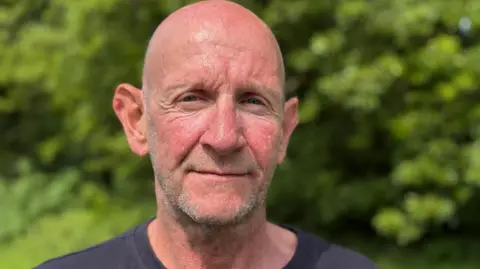 BBC
BBCThousands of people with alcohol-related brain damage (ARBD) could be going undiagnosed, an expert says.
Research suggests consuming 35 units of alcohol per week for five years or more can cause ARBD, which affects a person's ability to carry out basic daily tasks.
Lee Caldwell, 56, who was diagnosed with ARBD last year, said he struggled with short-term memory and impulse control.
Prof Gareth Roderique Davies said stigma and lack of awareness led to ARBD being missed or misdiagnosed, and said adequate resources remained a challenge.
The Welsh government said it was investing £67m to help people affected by drugs and alcohol, including ARBD.
If left undiagnosed, patients with ARBD can end up requiring long term nursing care, but with the right intervention they can improve and live independently.
Mr Caldwell was admitted to Brynawel House, a residential rehabilitation facility in south Wales, where he was diagnosed with ARBD last September.
He said said at the peak of his drinking he found it "easier to cross the road to the garage" to buy alcohol than to confront the feelings of guilt and shame associated with his habit.
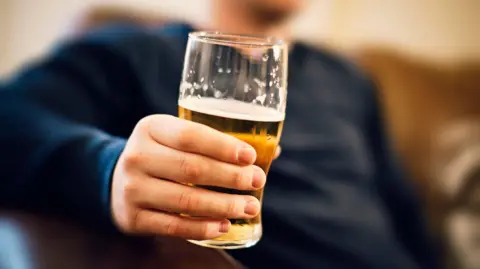 Getty Images
Getty Images"The addiction became more important than living," said Mr Caldwell, a former Royal Navy engineer and construction manager.
Explaining the daily challenges ARBD could present, he said: "One day [in rehab] I couldn't find my room."
"I could see room seven, there's eight – where's nine?"
"This lad I got on with said: 'It would help if you were in the right building – you live over there'."
Mr Caldwell said his longer term memory was unaffected but he struggled with "silly things" like whether he had taken his medication, as well as impulse control.
How many units are in alcoholic drinks?
- Pint of lower strength lager, beer or cider - 2 units
- Pint of higher strength lager, beer or cider - 3 units
- Small glass of wine (125ml) - 1.5 units
- Large glass of wine (250ml) - 3 units
- Single shot of spirits (25ml) - 1 unit
Source: NHS
Mr Caldwell said since undergoing six months of rehabilitation: "I don't wake up with cravings now and I am getting physically more and more fit".
"But I still worry about going out somewhere I'm not familiar with," he added.
"With ARBD, as you're recovering, your memory comes back, which doesn't happen to many people really."
Mr Caldwell had mixed feelings about leaving and returning to his home area of north Wales.
"I knew I could do it – but I know I'm an addict, so I was always waiting for that demon."
Asked if he could see how far he had come, he said: "No. But I can see how far I'm going to go."
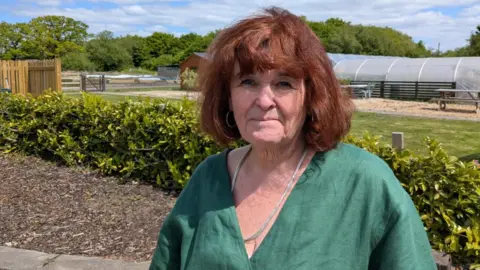
"Post-pandemic we are seeing people with far more extensive brain problems because of their drinking," said Sue Gwyn, chief executive of Brynawel House.
The charity provides rehabilitation for substance misuse, but specialises in ARBD.
She said patients were typically referred by local authorities and their cognitive function was then assessed.
"Even as low as 35 units of alcohol a week for maybe four or five years can impact on your brain," said Ms Gwyn.
"Sometimes [patients] will have been working with community services for 18 months but ARBD hasn't been picked up.
"And that's a worry because we know that up to 75% of people with ARBD, if they have rehab, they can make a very meaningful recovery.
"If it's not picked up the outcomes will be poorer for them, and in the most severe cases they're going to end up in long term nursing care.
"When you think that 36 units is around four bottles of wine, there are an awful lot of people who will be routinely drinking that as a minimum every week and thinking that's OK because they haven't got obvious liver problems.
"But we are as worried about people's brains as we are about anything else."

"We see a massive change in people by the time they leave," said occupational therapist at Brynawel House, Jan Bevan.
"Life evolved around alcohol and when they could get their next drink. But they're actually looking at a future and what's meaningful, because they'd forgotten what meaningful is."
She said part of her work was to help patients to build routines, with prompts to aid memory.
"My job is to ensure that when they go from here they have strategies and support to enable them to carry on."
As a charity and the only not-for-profit providing ARBD rehabilitation in Wales, Ms Gwyn said funding arrangements were not clear cut.
While area planning boards have ringfenced funding for addiction support, she said few would fund ARBD rehabilitation.
Support at Brynawel House, which includes a multi-disciplinary team and costs £1,760 a week, is provided for a minimum of six months.
"If you look at the long-term impact of somebody having to go into residential care for maybe 10 or 20 years, then six months or a year spent in rehab here, I think it is money well invested," she said.
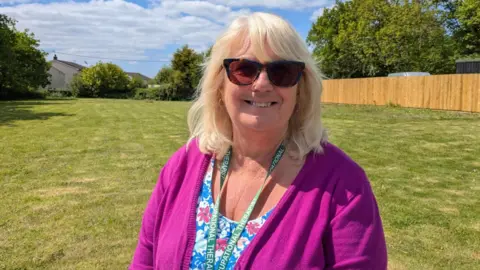
Prof Gareth Roderique Davies is co-lead of the addictions research group at the University of South Wales, where work is being done to better understand ARBD and its prevalence.
He said as co-author of the Welsh government's substance misuse treatment framework, published four years ago, he was frustrated with the lack of progress creating clinical pathways into treatment.
"In many ways Wales is leading the way in terms of recognising ARBD as an issue, but there is the road block of putting the appropriate resources in place in order to deal with it," he said.
"We did some research a few years ago which suggested a prevalence of about 34 per 100,000 in south Wales, which is almost certainly a huge underestimation.
"So just scaling up those figures, you're talking about thousands of people in Wales with a potential diagnosis."
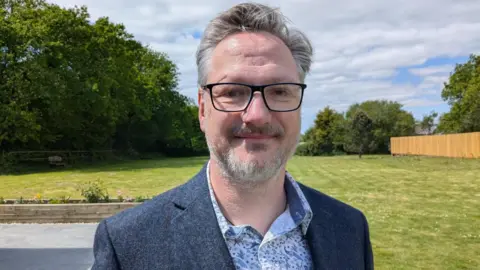
Prof Davies said stigma played a "big role" in people being correctly diagnosed.
"Individuals who are drinking excessively may present as confused and chaotic and possibly even aggressive and that immediately means they're treated in a stigmatised way," he said.
"Whereas in fact they're exhibiting signs of alcohol related brain damage. But the pathways to recovery are really, really ill defined.
"There is some evidence suggesting some individuals with ARBD are being misdiagnosed with early onset dementia. But memory clinics are not necessarily the right place for them because that's dealing with a degenerative disorder – whereas if interventions take place at the right time, ARBD doesn't have to get any worse.
"In many circumstances it can improve with correct intervention."
The Welsh government said it was investing more than £67m "to help people affected by drugs and alcohol, including people with alcohol related brain damage, to ensure a range of services and support is in place".
A spokesperson added: "Clinical pathways are a matter for each area planning board area to determine and it is important they work closely with all appropriate organisations to ensure early identification of ARBD."
